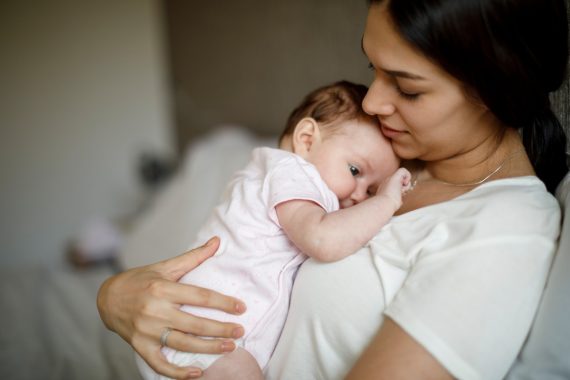The RCGP has issued urgent advice for parents to check their children’s vaccination status – and urgently book a GP appointment if they are not protected against whooping cough.
It has joined forces with other medical royal colleges to also urge pregnant women to take up the offer of pertussis vaccination, following devastating news of further baby deaths.
Yesterday the UK Health Security Agency (UKHSA) said three more babies died from whooping cough in April, bringing the total for this year to eight.
In the first four months of 2024 there have been 4,793 laboratory confirmed cases of pertussis compared with 858 across the whole of 2023.
All pregnant women are offered the pertussis vaccine during every pregnancy, usually between 16 and 32 weeks of their pregnancy, helping to protect their baby the first few weeks of its life until they are old enough to have the vaccine at eight weeks of age.
In joint advice with the Royal College of Midwives (RCM), the Royal College of Obstetricians and Gynaecologists (RCOG), and the Royal College of Paediatrics and Child Health (RCPCH), the RCGP urged parents to ensure their children are protected.
Parents should check their children’s vaccination record to ensure it is up to date as ‘vaccination is the only effective means’ to protect young babies and children from whooping cough, the colleges said.
Whooping cough can affect babies, children and adults and is spread in the droplets of the coughs or sneezes of someone with the infection.
It starts like many viral illnesses with cold-like symptoms: a runny nose and coughing spasms with worsening severity, sometimes worse at night, or with a gasping sound ‘whoop’ and occasionally difficulty in breathing.
It is ‘very important to seek help early’ especially if symptoms are ‘severe’, having an effect on breathing and causing skin colour to turn ‘more dusky and blue’, the colleges added.
But the condition is ‘preventable’, so this outbreak highlights the ‘paramount importance’ of engaging with vaccination programmes, the colleges said.
They also called for a ‘swift’ implementation of the NHS Vaccination Strategy by the Government to encourage the prioritisation of vaccine coverage.
RCGP chair Professor Kamila Hawthorne urged all parents to check that their children’s vaccinations are up to date, and if they’re not, to make an appointment at their GP surgery ‘as soon as possible’.
She said: ‘Having whooping cough is, for most people, an unpleasant experience, but for some it can be far more serious.
‘More vulnerable patients who may have a weakened immune system or are very young or elderly, can experience highly distressing symptoms.
‘However, this can be avoided. Vaccinations are an effective form of protection, so we would urge all parents to check that their children’s vaccinations are up to date, and if they’re not, to make an appointment at their GP surgery as soon as possible.
‘This outbreak, and the spike in measles cases at the start of 2024, have brought to the fore the dangers of vaccine complacency and hesitancy, and the importance of community outreach in addressing concerns and highlighting the effectiveness and safety of vaccinations.’
RCM professional professional policy advisor Clare Livingstone said: ‘We are urging all pregnant women to protect their baby from whooping cough by getting vaccinated.’
‘The immunity you get from the vaccine will pass to your baby through the placenta and provide passive protection for them until they are old enough to be routinely vaccinated against whooping cough at 8 weeks old.
‘It’s also not too late to have the vaccine if you have missed the window, women can still have this vaccine right up until they go into labour.
‘You can also have the vaccine at the same time as the flu jab.’
The RCM has also ‘called on all midwives to discuss this vital vaccine with the women in their care as part of their conversations about all vaccines that are recommended during pregnancy,’ she added.
Advice on accessing the vaccine
- All pregnant women will be offered the pertussis vaccine during every pregnancy, usually between 16 and 32 weeks of their pregnancy, helping to protect their baby the first few weeks of its life until they are old enough to have the vaccine at 8 weeks of age.
- In infancy, all children are given three doses of the 6-in-1 vaccine at 8, 12 and 16 weeks of age to protect against whooping cough. If you, or a member of your family, does exhibit symptoms of whooping cough – especially a heavy wheezing cough that disrupts sleep, or a change in the colour of the face – then seek medical assistance. Whooping cough can be treated with antibiotics, and if severe, may require hospital admission.
Source: RCGP
In March, UKHSA issued warnings to parents of babies and pregnant women to urgently take up offers of vaccination amidst rising cases of pertussis as part of national awareness campaigns.
As part of the annual analysis of attitudes towards vaccination, 20% of parents surveyed in 2023 said they had come across information online that made them concerned, compared with 6% the year before, UKHSA officials reported earlier this year.
Pulse October survey
Take our July 2025 survey to potentially win £1.000 worth of tokens













